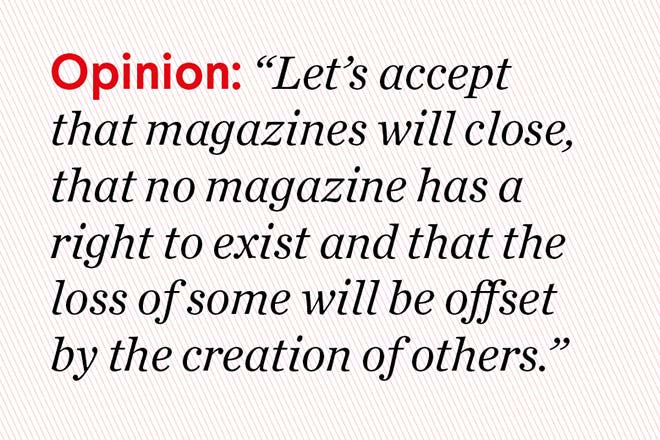
Sometimes magazines die
For this month’s Opinion post, Rob Alderson asks if its always bad news when a magazine closes.
Late last week, ESPN announced it was closing Grantland, its four-year-old sports and pop culture site. Grantland was much-loved by many for championing longform writing – with thousands of words expended on unashamedly niche topics. Its closure was a familiar story. ESPN, which had recently laid off 300 workers, didn’t feel it provided value for money any longer – or in corporate press release speak: “We have decided to direct our time and energy going forward to projects that we believe will have a broader and more significant impact across our enterprise.”
Many people on my Twitter feed were very sorry to see Grantland go – a mixture sadness at its demise, fear for the future of similar journalistic enterprises and indignation at its parent company’s shortsighted greed (as they saw it). The most thoughtful response I read came from former editor Sean Fennessey (who recently left Grantland as part of an exodus of senior staff).
In a moving but measured blog post, Fennessey compared the closure of Grantland to the closure of Vibe magazine, which shut back in 2009 when he was music editor. “Vibe was folding, immediately, because it’s a magazine, and that’s what they do,” he wrote. “They start and they end, unless you’re lucky or lousy.”
This struck me as a very sensible way to think about magazines and their inevitable life cycles. Every time a title announces that it has printed its last, the tributes tend to tip into a kind of collective grief and a bewailing of whichever forces are supposed to have led to its downfall.
Whenever this happens, I am reminded of the Friends episode where Ross goes to check on the pet monkey he had given to a zoo, only to find it has died (aficionados of the show will know the monkey had actually become a movie star, but that needn’t concern us here). Shocked to hear his beloved Marcel is no more, Ross is comforted by the zoo manager.
“I’m sorry Mr. Geller. But you know, there’s an old saying: ‘Sometimes monkeys die.’ It’s not a great saying, but it certainly is fitting today.”
Similarly, sometimes magazines die. The reasons for this can be numerous and complex, or singular and straightforward. They can be financial or cultural, caused by bad owners, bad editors or bad decisions. Some magazines close because they can’t or won’t adapt, others close because they change too much. They may run out of steam or they may jump the shark – countless other metaphors are available. Some brilliant magazines close; so do many terrible ones.
And while it’s great to pay tribute to fallen comrades and bask in memories of the good times – and it’s prudent to analyse which factors contributed to their closures – it’s strange to greet all of these closures with an automatic mix of grief and anxiety. Maybe it’s because, despite the widespread confidence that print isn’t dead, any magazine’s decline provokes an uncomfortable “but what if?” doubt, like a slick-suited climate change denier forced to acknowledge that the hydrangeas in his garden really are flowering earlier and earlier each year.
Let’s accept that magazines will close, that no magazine has a right to exist and that the loss of some will be offset by the creation of others. In fact let’s go further. Maybe some magazines that are starting to wane could be killed off by their makers. Rather than managing a decline that may or may not be their fault, these teams could then use their experience and expertise to start new ventures and honour print media’s past by shaping its future.
Perhaps also there is huge value in those magazine-makers whose titles do close talking about what happened. This industry can be obsessed with breathless talk of so-called golden ages and hagiographic success stories. Credit where it’s due, of course, but there’s huge value too in honest tales of how and why a magazine ceased to be. Maybe if these stories were told more frequently, the loss of certain titles would be less of a shock to our collective system.
Which brings us back to Sean Fennessey and his near-perfect way of summing up the magazine-making experience. “You get a chance, you make your chance, you go forward; you get heartbroken, you start again, because this feels valuable.”


